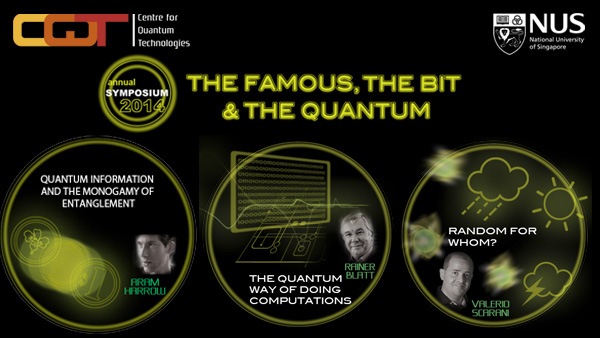
CQT Annual Symposium 2014: The famous, the bit and the quantum
Date and time
Location
Ngee Ann Kongsi Auditorium
University Town, Education Resource Centre, Level 2 National University of Singapore Singapore, 138608Description

The CQT Annual Symposium is being held to celebrate the Centre's seventh birthday. Guests are invited to attend talks on topics at the forefront of research in quantum technologies.
PROGRAMME:
4pm
"Quantum information and the monogamy of entanglement"
Aram Harrow, Massachusetts Institute of Technology, USA
Abstract: The recent field of quantum information and computing approaches quantum mechanics not as a source of paradoxes or difficulties, but as a new theory of information. For example, Heisenberg's uncertainty principle can be seen not only as limitation on our ability to measure, but also can be used to construct new methods of sending secret messages. In this talk, I will first give an overview of the mathematics of quantum information and computing.
Then I'll discuss a phenomenon known as "monogamy of entanglement" that has been a recent focus of my own research. Entanglement is a quantum analogue to correlations from probability theory. Unlike correlations, however, entanglement cannot be shared without limit; i.e. it is monogamous. I will discuss the surprising implications of this fact for mathematics, physics and computer science.
5.00pm: break
5.15pm
"The Quantum Way of Doing Computations"
Rainer Blatt, University of Innsbruck, Austria
Abstract: Since the mid nineties of the 20th century it became apparent that one of the centuries’ most important technological inventions, computers in general and many of their applications could possibly be further enormously enhanced by using operations based on quantum physics. This is timely since the classical roadmaps for the development of computational devices, commonly known as Moore’s law, will cease to be applicable within the next decade due to the ever smaller sizes of the electronic components that soon will enter the quantum physics realm. Computations, whether they happen in our heads or with any computational device, always rely on real physical processes, which are data input, data representation in a memory, data manipulation using algorithms and finally, the data output. Building a quantum computer then requires the implementation of quantum bits (qubits) as storage sites for quantum information, quantum registers and quantum gates for data handling and processing and the development of quantum algorithms.
In this talk, the basic functional principle of a quantum computer will be reviewed. It will be shown how strings of trapped ions can be used to build a quantum information processor and how basic computations can be performed using quantum techniques. In particular, the quantum way of doing computations will be illustrated by analog and digital quantum simulations and the basic scheme for quantum error correction will be introduced and discussed. Scaling-up the ion-trap quantum computer can be achieved with interfaces for ion-photon entanglement based on high-finesse optical cavities and cavity-QED protocols, which will be exemplified by recent experimental results.
6.15pm: break
6.30pm
"Random for whom?"
Valerio Scarani, Centre for Quantum Technologies, NUS
Abstract: There is a difference between the impossibility of predicting the weather and the impossibility of giving a value to both position and momentum of an electron. This difference is what makes quantum physics hard to understand: intrinsic randomness. In this talk, I shall try to clarify what "intrinsic randomness" means, how we can be sure that it is "real" and not an artefact of an imperfect theory. Besides shaping our view of the natural world in an unexpected way, the existence of intrinsic randomness may even lead to practical benefits
7.30pm: End of Symposium
Organized by
Would you like to receive announcements about CQT public events by email? Sign up here.
More about us
The Centre for Quantum Technologies (CQT) is a national Research Centre of Excellence in Singapore. It brings together physicists, computer scientists and engineers to do basic research on quantum physics and to build devices based on quantum phenomena. Experts in this new discipline of quantum technologies are applying their discoveries in computing, communications and sensing.
The Centre was established in December 2007 with support from Singapore’s National Research Foundation and Ministry of Education. CQT is hosted by the National University of Singapore (NUS) and also has staff at Nanyang Technological University (NTU).
Data protection